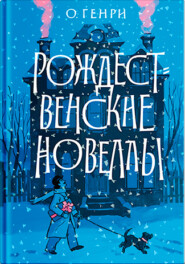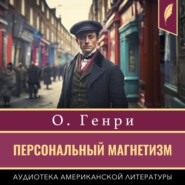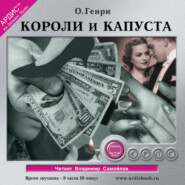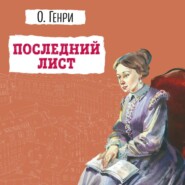По всем вопросам обращайтесь на: info@litportal.ru
(©) 2003-2024.
✖
The Gentle Grafter
Настройки чтения
Размер шрифта
Высота строк
Поля
"It ain't so much losing the money, mister," says she, shaking all over, "though I've been two years saving it up; but Jakey won't marry me now. He'll take Rosa Steinfeld. I know J – J – Jakey. She's got $400 in the savings bank. Ai, ai, ai – " she sings out.
Buck looks all around with that same funny look on his face. And then we see leaning against the wall, puffing at his pipe, with his eye shining at us, this newspaper reporter. Buck and me walks over to him.
"You're a real interesting writer," says Buck. "How far do you mean to carry it? Anything more up your sleeve?"
"Oh, I'm just waiting around," says the reporter, smoking away, "in case any news turns up. It's up to your stockholders now. Some of them might complain, you know. Isn't that the patrol wagon now?" he says, listening to a sound outside. "No," he goes on, "that's Doc. Whittleford's old cadaver coupé from the Roosevelt. I ought to know that gong. Yes, I suppose I've written some interesting stuff at times."
"You wait," says Buck; "I'm going to throw an item of news in your way."
Buck reaches in his pocket and hands me a key. I knew what he meant before he spoke. Confounded old buccaneer – I knew what he meant. They don't make them any better than Buck.
"Pick," says he, looking at me hard, "ain't this graft a little out of our line? Do we want Jakey to marry Rosa Steinfeld?"
"You've got my vote," says I. "I'll have it here in ten minutes." And I starts for the safe deposit vaults.
I comes back with the money done up in a big bundle, and then Buck and me takes the journalist reporter around to another door and we let ourselves into one of the office rooms.
"Now, my literary friend," says Buck, "take a chair, and keep still, and I'll give you an interview. You see before you two grafters from Graftersville, Grafter County, Arkansas. Me and Pick have sold brass jewelry, hair tonic, song books, marked cards, patent medicines, Connecticut Smyrna rugs, furniture polish, and albums in every town from Old Point Comfort to the Golden Gate. We've grafted a dollar whenever we saw one that had a surplus look to it. But we never went after the simoleon in the toe of the sock under the loose brick in the corner of the kitchen hearth. There's an old saying you may have heard – 'fussily decency averni' – which means it's an easy slide from the street faker's dry goods box to a desk in Wall Street. We've took that slide, but we didn't know exactly what was at the bottom of it. Now, you ought to be wise, but you ain't. You've got New York wiseness, which means that you judge a man by the outside of his clothes. That ain't right. You ought to look at the lining and seams and the button-holes. While we are waiting for the patrol wagon you might get out your little stub pencil and take notes for another funny piece in the paper."
And then Buck turns to me and says: "I don't care what Atterbury thinks. He only put in brains, and if he gets his capital out he's lucky. But what do you say, Pick?"
"Me?" says I. "You ought to know me, Buck. I didn't know who was buying the stock."
"All right," says Buck. And then he goes through the inside door into the main office and looks at the gang trying to squeeze through the railing. Atterbury and his hat was gone. And Buck makes 'em a short speech.
"All you lambs get in line. You're going to get your wool back. Don't shove so. Get in a line – a line– not in a pile. Lady, will you please stop bleating? Your money's waiting for you. Here, sonny, don't climb over that railing; your dimes are safe. Don't cry, sis; you ain't out a cent. Get in line, I say. Here, Pick, come and straighten 'em out and let 'em through and out by the other door."
Buck takes off his coat, pushes his silk hat on the back of his head, and lights up a reina victoria. He sets at the table with the boodle before him, all done up in neat packages. I gets the stockholders strung out and marches 'em, single file, through from the main room; and the reporter man passes 'em out of the side door into the hall again. As they go by, Buck takes up the stock and the Gold Bonds, paying 'em cash, dollar for dollar, the same as they paid in. The shareholders of the Golconda Gold Bond and Investment Company can't hardly believe it. They almost grabs the money out of Buck's hands. Some of the women keep on crying, for it's a custom of the sex to cry when they have sorrow, to weep when they have joy, and to shed tears whenever they find themselves without either.
The old women's fingers shake when they stuff the skads in the bosom of their rusty dresses. The factory girls just stoop over and flap their dry goods a second, and you hear the elastic go "pop" as the currency goes down in the ladies' department of the "Old Domestic Lisle-Thread Bank."
Some of the stockholders that had been doing the Jeremiah act the loudest outside had spasms of restored confidence and wanted to leave the money invested. "Salt away that chicken feed in your duds, and skip along," says Buck. "What business have you got investing in bonds? The tea-pot or the crack in the wall behind the clock for your hoard of pennies."
When the pretty girl in the red shawl cashes in Buck hands her an extra twenty.
"A wedding present," says our treasurer, "from the Golconda Company. And say – if Jakey ever follows his nose, even at a respectful distance, around the corner where Rosa Steinfeld lives, you are hereby authorized to knock a couple of inches of it off."
When they was all paid off and gone, Buck calls the newspaper reporter and shoves the rest of the money over to him.
"You begun this," says Buck; "now finish it. Over there are the books, showing every share and bond issued. Here's the money to cover, except what we've spent to live on. You'll have to act as receiver. I guess you'll do the square thing on account of your paper. This is the best way we know how to settle it. Me and our substantial but apple-weary vice-president are going to follow the example of our revered president, and skip. Now, have you got enough news for to-day, or do you want to interview us on etiquette and the best way to make over an old taffeta skirt?"
"News!" says the newspaper man, taking his pipe out; "do you think I could use this? I don't want to lose my job. Suppose I go around to the office and tell 'em this happened. What'll the managing editor say? He'll just hand me a pass to Bellevue and tell me to come back when I get cured. I might turn in a story about a sea serpent wiggling up Broadway, but I haven't got the nerve to try 'em with a pipe like this. A get-rich-quick scheme – excuse me – gang giving back the boodle! Oh, no. I'm not on the comic supplement."
"You can't understand it, of course," says Buck, with his hand on the door knob. "Me and Pick ain't Wall Streeters like you know 'em. We never allowed to swindle sick old women and working girls and take nickels off of kids. In the lines of graft we've worked we took money from the people the Lord made to be buncoed – sports and rounders and smart Alecks and street crowds, that always have a few dollars to throw away, and farmers that wouldn't ever be happy if the grafters didn't come around and play with 'em when they sold their crops. We never cared to fish for the kind of suckers that bite here. No, sir. We got too much respect for the profession and for ourselves. Good-by to you, Mr. Receiver."
"Here!" says the journalist reporter; "wait a minute. There's a broker I know on the next floor. Wait till I put this truck in his safe. I want you fellows to take a drink on me before you go."
"On you?" says Buck, winking solemn. "Don't you go and try to make 'em believe at the office you said that. Thanks. We can't spare the time, I reckon. So long."
And me and Buck slides out the door; and that's the way the Golconda Company went into involuntary liquefaction.
If you had seen me and Buck the next night you'd have had to go to a little bum hotel over near the West Side ferry landings. We was in a little back room, and I was filling up a gross of six-ounce bottles with hydrant water colored red with aniline and flavored with cinnamon. Buck was smoking, contented, and he wore a decent brown derby in place of his silk hat.
"It's a good thing, Pick," says he, as he drove in the corks, "that we got Brady to lend us his horse and wagon for a week. We'll rustle up the stake by then. This hair tonic'll sell right along over in Jersey. Bald heads ain't popular over there on account of the mosquitoes."
Directly I dragged out my valise and went down in it for labels.
"Hair tonic labels are out," says I. "Only about a dozen on hand."
"Buy some more," says Buck.
We investigated our pockets and found we had just enough money to settle our hotel bill in the morning and pay our passage over the ferry.
"Plenty of the 'Shake-the-Shakes Chill Cure' labels," says I, after looking.
"What more do you want?" says Buck. "Slap 'em on. The chill season is just opening up in the Hackensack low grounds. What's hair, anyway, if you have to shake it off?"
We pasted on the Chill Cure labels about half an hour and Buck says:
"Making an honest livin's better than that Wall Street, anyhow; ain't it, Pick?"
"You bet," says I.
HOSTAGES TO MOMUS
I
I never got inside of the legitimate line of graft but once. But, one time, as I say, I reversed the decision of the revised statutes and undertook a thing that I'd have to apologize for even under the New Jersey trust laws.
Me and Caligula Polk, of Muskogee in the Creek Nation, was down in the Mexican State of Tamaulipas running a peripatetic lottery and monte game. Now, selling lottery tickets is a government graft in Mexico, just like selling forty-eight cents' worth of postage-stamps for forty-nine cents is over here. So Uncle Porfirio he instructs the rurales to attend to our case.
Rurales? They're a sort of country police; but don't draw any mental crayon portraits of the worthy constables with a tin star and a gray goatee. The rurales– well, if we'd mount our Supreme Court on broncos, arm 'em with Winchesters, and start 'em out after John Doe et al. we'd have about the same thing.
When the rurales started for us we started for the States. They chased us as far as Matamoras. We hid in a brickyard; and that night we swum the Rio Grande, Caligula with a brick in each hand, absent-minded, which he drops upon the soil of Texas, forgetting he had 'em.
From there we emigrated to San Antone, and then over to New Orleans, where we took a rest. And in that town of cotton bales and other adjuncts to female beauty we made the acquaintance of drinks invented by the Creoles during the period of Louey Cans, in which they are still served at the side doors. The most I can remember of this town is that me and Caligula and a Frenchman named McCarty – wait a minute; Adolph McCarty – was trying to make the French Quarter pay up the back trading-stamps due on the Louisiana Purchase, when somebody hollers that the johndarms are coming. I have an insufficient recollection of buying two yellow tickets through a window; and I seemed to see a man swing a lantern and say "All aboard!" I remembered no more, except that the train butcher was covering me and Caligula up with Augusta J. Evans's works and figs.
When we become revised, we find that we have collided up against the State of Georgia at a spot hitherto unaccounted for in time tables except by an asterisk, which means that trains stop every other Thursday on signal by tearing up a rail. We was waked up in a yellow pine hotel by the noise of flowers and the smell of birds. Yes, sir, for the wind was banging sunflowers as big as buggy wheels against the weatherboarding and the chicken coop was right under the window. Me and Caligula dressed and went down-stairs. The landlord was shelling peas on the front porch. He was six feet of chills and fever, and Hongkong in complexion though in other respects he seemed amenable in the exercise of his sentiments and features.
Caligula, who is a spokesman by birth, and a small man, though red-haired and impatient of painfulness of any kind, speaks up.
"Pardner," says he, "good-morning, and be darned to you. Would you mind telling us why we are at? We know the reason we are where, but can't exactly figure out on account of at what place."
"Well, gentlemen," says the landlord, "I reckoned you-all would be inquiring this morning. You-all dropped off of the nine-thirty train here last night; and you was right tight. Yes, you was right smart in liquor. I can inform you that you are now in the town of Mountain Valley, in the State of Georgia."
"On top of that," says Caligula, "don't say that we can't have anything to eat."
"Sit down, gentlemen," says the landlord, "and in twenty minutes I'll call you to the best breakfast you can get anywhere in town."

















